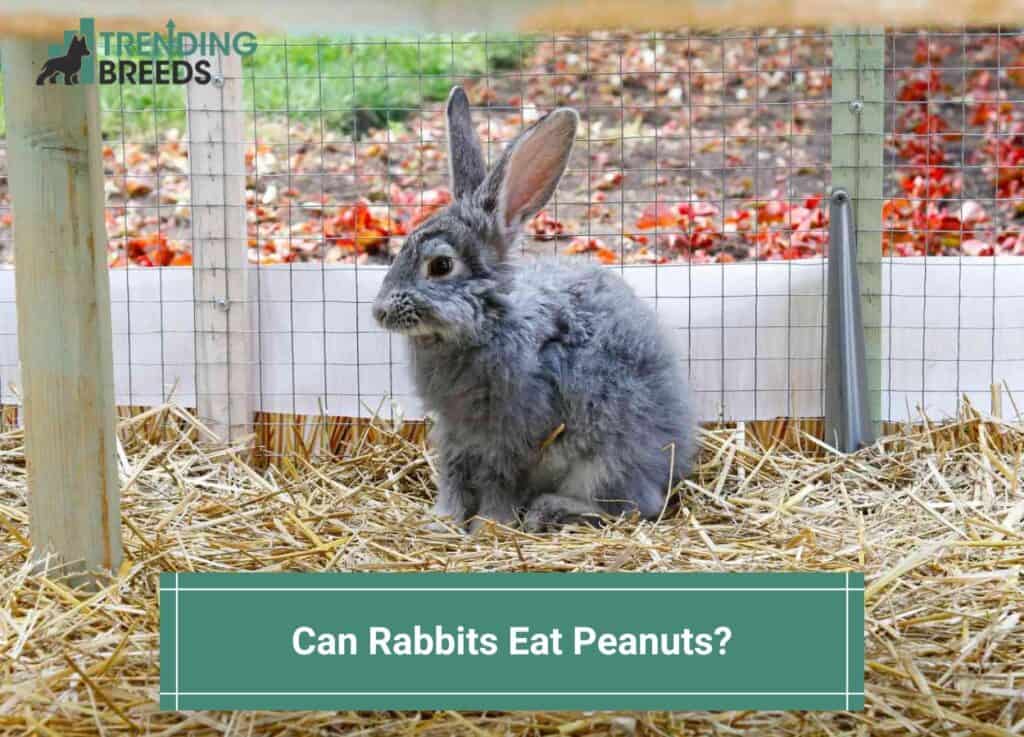
Humans love peanuts, Let’s face it, we love it so much that we have peanut butter every morning! They are delicious and healthy. However, you may be wondering if it is also safe to feed your rabbit peanuts. If so, then keep reading below.
While rabbits can technically eat peanuts, it is not recommended as part of their regular diet due to the high-fat content, which can cause digestive upset and the presence of aflatoxins which are toxic to rabbits.
If you do decide to give your rabbit peanuts, it is important to do so in moderation and to watch for any signs of discomfort or illness.
Keep reading below as we discuss this in more detail in the next section.
Other articles you would like: Why Is My Rabbit Throwing Up? and What Does It Mean When A Bunny Licks You?
Can Rabbits Eat Peanuts?
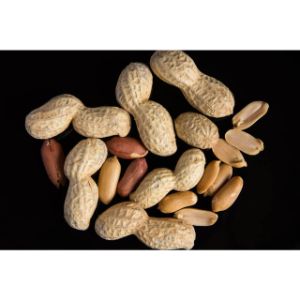
Rabbits are herbivorous animals, and their diet should consist primarily of hay, fresh vegetables, and a small number of pellets specifically formulated for rabbits.
Peanuts, while they are a legume and common snack food for humans, are not a natural part of a rabbit’s diet and can pose several risks to their health if fed in excess.
Risks of Feeding Rabbits Peanuts
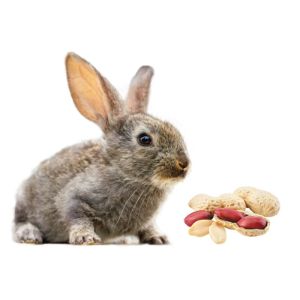
Following are some of the risks of feeding rabbits peanuts:
Obesity
One of the main risks associated with feeding rabbits peanuts is their high-fat content. Rabbits have delicate digestive systems, and a diet high in fat can lead to gastrointestinal problems such as diarrhea, gas, and bloating.
Consuming too many peanuts can also lead to obesity in rabbits, which can in turn lead to other health problems such as heart disease and joint issues.
Aflatoxins
Another risk associated with feeding rabbits peanuts is the presence of aflatoxins, which are toxic substances produced by certain molds that can grow on peanuts and other types of nuts.
Aflatoxins can cause liver damage and can also be carcinogenic. Ingestion of aflatoxins in high amounts can lead to death in rabbits, and even small amounts can cause long-term health problems.
Allergic Reactions
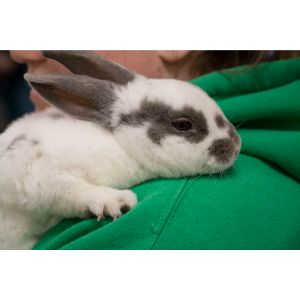
Additionally, peanuts are also known to be allergenic, it can be possible that feeding peanuts to your rabbit can cause allergic reactions.
Some common symptoms of allergic reactions in rabbits include itching, redness, and swelling of the skin, as well as digestive issues such as vomiting and diarrhea.
It’s important to note that rabbits may have allergies or sensitivities to certain foods, including peanuts, and it’s important to monitor your rabbit’s health if you decide to feed them peanuts as a treat.
Dental Problems
Feeding rabbits peanuts in excess can also cause dental problems. Treats like peanuts can lead to an overgrowth of incisors, which can make it difficult for the rabbit to eat and groom properly.
This can also lead to malocclusion, which is when the upper and lower teeth do not meet correctly, can cause pain and difficulty eating.
Disruption in Diet
It’s also important to note that feeding too many treats to rabbits, including peanuts, can disrupt the balance of their diet and not give them the nutrition they need to stay healthy.
Feeding rabbits a diet that is high in treats and low in hay, greens, and pellet can cause nutritional deficiencies, leading to health problems.
How to Safely Feed Rabbits Peanuts
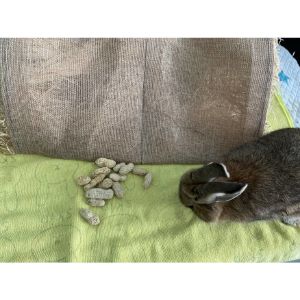
Feeding your rabbit peanuts can be a tricky matter, as they are not a natural part of a rabbit’s diet and can pose risks to their health if fed in excess. However, with proper care and precautions, it is possible to safely feed your rabbit peanuts as an occasional treat.
Quantity
First and foremost, it is important to understand that rabbits have delicate digestive systems and even small changes to their diet can cause upset stomachs, diarrhea, and other health problems.
Therefore, it is essential to feed your rabbit peanuts in moderation.
A safe and reasonable serving size of peanuts for a rabbit would be around a teaspoon or two, per week. It’s important to monitor your rabbit’s health closely and make sure they are not showing any signs of discomfort or illness after consuming the peanuts.
Quality
It’s also important to pay attention to the quality of the peanuts. Choose peanuts that are fresh, raw and unsalted; since salted peanuts can cause health problems.
Avoid feeding your rabbit roasted, flavored or salted peanuts as these can be unhealthy for them and contain high levels of salt which can cause health problems. Also, avoid feeding your rabbit peanuts with mold as it can contain aflatoxins which are toxic to rabbits.
Only Feed as Treats
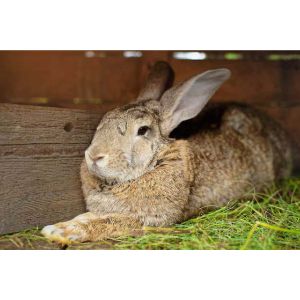
Another important thing to keep in mind is to not feed your rabbit peanuts as a replacement of their regular diet which should consist primarily of hay, fresh vegetables and a small amount of pellets formulated for rabbits.
Treats like peanuts should be fed in addition to their regular diet and in small quantities to avoid disrupting the balance of their diet. Feeding too many treats, including peanuts, can cause nutritional deficiencies leading to health problems.
Allergies/Sensitivities
It’s also important to be aware of any potential allergies or sensitivities that your rabbit may have towards peanuts.
As mentioned before, some rabbits may have an allergic reaction to peanuts, and if you suspect that your rabbit is showing signs of discomfort or illness after consuming peanuts, discontinue feeding them and consult with a veterinarian for guidance.
Oral Hygiene
In addition, it’s important to maintain good oral hygiene for your rabbit as treats like peanuts can lead to an overgrowth of incisors, which can make it difficult for the rabbit to eat and groom properly.
To maintain good oral health, provide your rabbit with plenty of hay and make sure they have constant access to it, this will help them to wear their teeth down naturally.
What Seeds Can Rabbits Eat?
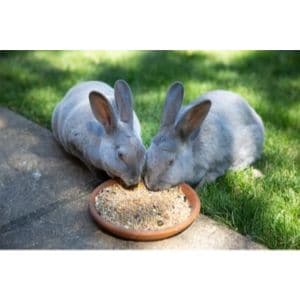
There are several types of seeds that rabbits can eat, including grass seeds, clover seeds, and alfalfa seeds. These seeds are high in fiber and an excellent source of essential nutrients like vitamins, minerals, and antioxidants.
Grass seeds, in particular, are a great choice for rabbits, as they are high in protein and can help to keep their coats shiny and healthy.
Clover seeds are another great option for rabbits, as they are full of protein and also contain important minerals like calcium, phosphorus, and magnesium.
These seeds can be fed to rabbits as a treat, or can be added to their regular food to supplement their diet.
Alfalfa seeds are also a good choice for rabbits, as they too are rich in protein, fiber, and important vitamins and minerals.
These seeds can be fed to rabbits in the form of hay, which is a great way to provide them with the necessary roughage to keep their digestive systems healthy.
Are Almonds Toxic to Rabbits?
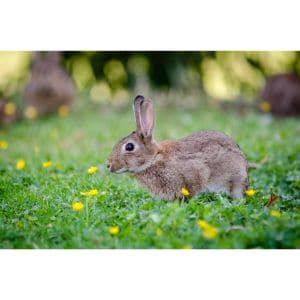
Almonds contain a type of compound called cyanogenic glycoside, which can release cyanide upon exposure to the enzyme linamarase, which is present in the gut.
The concentration of cyanogenic glycoside in almonds is generally considered low, and generally speaking, it is considered safe for human consumption.
The amount of cyanide that is released from almonds is dependent on a number of factors, including the variety of almond, the ripeness of the almond, and the processing method used.
For example, bitter almonds, which are used to make marzipan and almond oil, contain much higher levels of cyanide than sweet almonds, which are the type most commonly consumed by humans.
Additionally, unprocessed or raw almonds contain higher levels of cyanogenic glycoside than roasted or blanched almonds.
While the risk of cyanide poisoning from almonds in humans is considered low, the same is not necessarily true for rabbits.
This is because rabbits have a much higher metabolism than humans, which means that they can break down cyanogenic glycoside more quickly and release more cyanide in the process.
Rabbits also have a very sensitive digestive system, which means that they can be more susceptible to the toxic effects of cyanide.
And it’s not just almonds that have the potential to cause cyanide poisoning, other plants and vegetables such as spinach, bamboo, lima beans, and flax seed also contain cyanogenic glycoside.
Therefore, it’s important to be careful when feeding your rabbit any type of plants or vegetables, and to be aware of the potential risks.
Conclusion For “Can Rabbits Eat Peanuts”
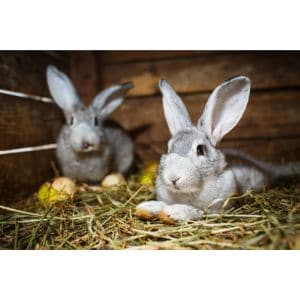
The conclusion is that rabbits cannot consume peanuts. Peanuts are not good for rabbits despite not being harmful. In other words, although sweet and crunchy, peanuts do not provide any nutritional advantages to the rabbit.
Nevertheless, there is nothing to worry about if your rabbit manages to locate a long-lost peanut underneath the oven or takes one from your food bowl. This is because peanuts are not poisonous to rabbits.
You will also like:
You can learn more about a rabbits diet by watching “WHAT TO FEED A RABBIT – Rabbit Diet” down below:




